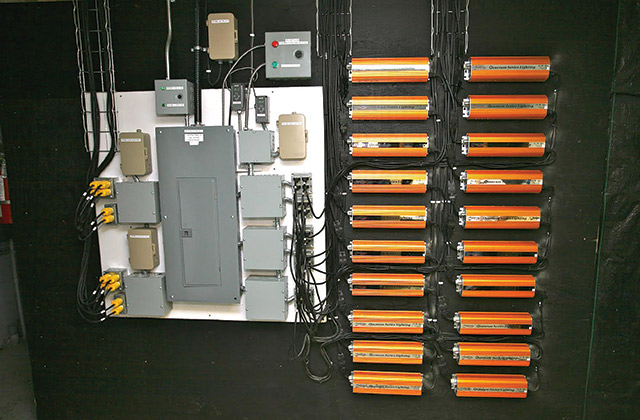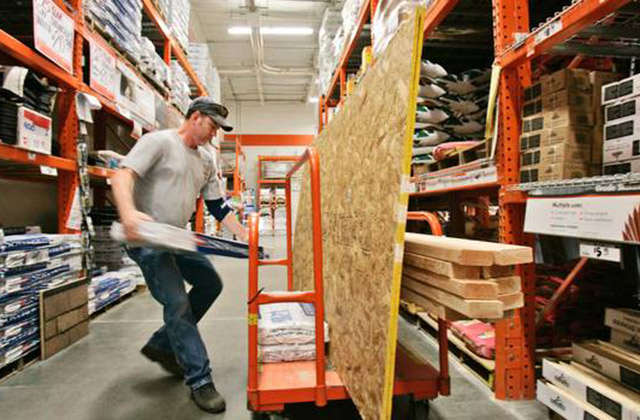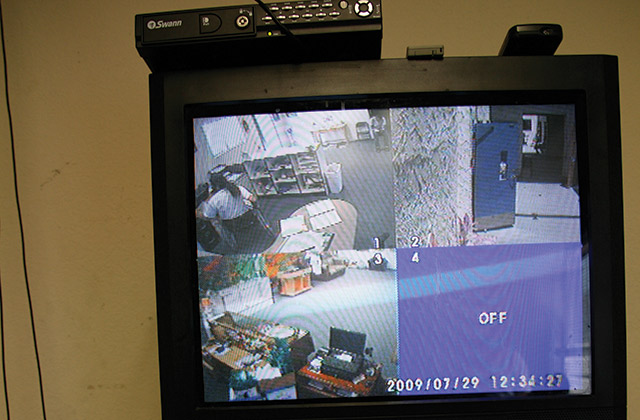Despite the increasing success of legalization efforts across the country, marijuana gardens still draw a lot of heat. Keeping a tight veil of secrecy around your grow will prevent eviction, the theft of your plants and unwanted visits from the police.
Be Paranoid
Don’t tell anyone about your grow, unless you trust them completely. If cultivation is illegal in your state, you’re better off keeping your grow a total secret. If anyone finds out, you can consider the operation pretty close to compromised. If you’ve taken the necessary precautions to physically conceal your grow op, letting someone know defeats your attempts at secrecy. As the saying goes, loose lips sink ships—and nothing can be truer in the underground marijuana market.
Dealing With Neighbors
My advice is to steer clear of apartment or condominium complexes with housing associations. The people “in power” on housing boards actively look for infractions of their by-laws, just to have something to do. If you do grow in an apartment complex, remember: Some residents take an active interest in their surroundings, and it only takes one observant dick to bring you down. Figure out who that might be and assume you’re always being watched.
If you’re growing in an apartment, you also need to consider who lives directly on the other side of your growroom’s walls. If your equipment is noisy, acoustic insulation is an absolute must. Avoid constantly bringing grow gear in and out of your dwelling. Certain trips are unavoidable, so disguise obvious items like bags of soil or bottles of fertilizer.
To maintain a façade of normalcy, avoid smoking in or around any house or apartment that has a growroom, unless you’re absolutely sure your neighbors can’t detect the smell.
Your Digital Footprint
Is it possible that your name has ever surfaced during an investigation of criminal activity involving drugs? Does anyone on your Facebook account have a criminal record involving marijuana? Do you appear in any pictures with current pot growers or dealers, convicted or not? If a close friend has ever been busted, and the cops confiscated that person’s phone, you can be sure you’re on their radar to some degree. This might not mean the police are actively investigating you, but the more documented associations you have with marijuana, the easier it is for the cops to get a warrant and raid your home if something—or someone—tips them off.
Think About Power
Try, discreetly, to obtain your electric bills from the previous year to gauge how much power you should use. A sudden spike in electrical use can draw suspicion from power companies—and if you’re a bit too curious about this information, you can land on that same watch list. Eliminating the use of other high-consumption electrical appliances—big fridges, washers, dryers, dishwashers, stoves, etc.—will help reduce overall consumption to make more room for powering your grow.

Make sure your grid can handle the juice.
Smart Shopping
Buy your grow gear at diverse locations over an extended period of time—preferably in cash. Most of what you need to grow is available at big-box hardware stores. When you make these purchases, buy other non-grow items, too. Also, drive during rush hour to avoid possible tails. Shopping online can put you on the map, but investigators will need more evidence to charge you or even get a warrant—in most cases, that is.
Intelligent Research
Keep your online activity to a minimum. If you need to ask a grow question, use a computer that has no trace of your name on it, that’s never been used to access your personal email or social media—and, most importantly, that’s not connected to a router registered under your name. You can attain Internet anonymity using Tor Browser to make searches, but you won’t be able to watch videos or download content. Tor hides the information being transmitted, but third parties can still tell you’re using it. You can use Tor on public Wi-Fi, but don’t create a pattern of going to the same place—and never access your email or social media during a grow-related browsing session.

Dress the part in hardware stores.
Running Vents
Plan your ventilation system before you cool heat-generating lamps and ballasts or circulate air in your growroom. Avoid using a random, sketchy duct that you’ve made yourself to expel hot air. Instead, piggyback your vent on an existing one: Vents coming from a dryer, bathroom or kitchen already expel hot and humid air on a semi-regular basis.
Temperature Troubles
Imagine a quiet suburban neighborhood under a blanket of snow; now imagine one house whose roof is oddly snow-free. Some indoor grows give themselves away during winter by melting the snow on the roof above them. In the summer, a wall or window constantly covered in condensation is just as suspect.

Don’t let it get too hot!
To keep heat under control, stop it at the source. Using cool tubes will focus the airflow right around the bulbs, allowing you to position them closer to your plants. An insulated and separately ventilated housing above the lamps will also stop hot air from pooling at the ceiling.
Insulate Yourself
Seal up any cracks with smoke-proof caulk, and weatherproof your doors to make sure air doesn’t leak out. Foam insulation and reflective material will prevent excessive amounts of heat from escaping through the walls and ceiling. Reflective materials like aluminum foil block irradiative heat especially well in closely separated layers.
Look into soundproofing materials if you use noisy appliances like water pumps, air conditioners, generators and extractor fans. In an apartment, any machine should be padded and isolated from the ground or walls so that it doesn’t transmit vibrations to unfriendly ears. Invest in fans and pumps engineered to generate less noise if you know that it might be a problem.
Turn Down the Noise
Aside from the noise you might create with fans, humming ballasts and water pumps, there’s another kind of noise that could get your garden busted: radio-frequency interference (RFI). Digital ballasts—especially poorly made ones—generate radio waves on frequencies used for AM radio. Long wires act as antennas broadcasting this static up to a mile away. Check out any ham-radio forum; you’ll be surprised how notorious pot-garden RFI noise has become among this peculiar crowd, as it interferes with their broadcasting. Cops are getting wise to this phenomenon as well and have started using it to catch growers.
RFI also interferes with Wi-Fi signals—something of which cable providers are well aware. Growers have received visits from pesky cable technicians looking into the source of the radiation. If you have neighbors who are streaming video, RFI will interfere with their entertainment. By keeping it to a minimum, you’ll have an easier time staying off the grid.
You can prevent RFI by using quality digital ballasts that use “square wave technology,” which helps cut out the interference and also extends the life of the bulb. You should also install “chokes” on the connections with ballasts to stop the long wires from turning into giant antennas.
A special paint exists that can block RFI. It’s used primarily to prevent Wi-Fi interference from neighbors, but it can help dampen RFI emitted by growroom electronics. Aluminum foil or other similar reflective materials can also reduce RFI.
Suspicious Windows
To truly disguise a window with a growroom on the other side, make the inside of the room look completely blank. Nosy neighbors or cops should see absolutely nothing, even if they’re standing up close. Do this by building an enclosure around the inside of the window and painting it black. Then keep your curtains or blinds completely closed—always! Anyone trying to peek in will see only darkness.

Orange light draws in cops like flies, so keep those windows inconspicuous.
Something Smells Like Skunk
Managing the aroma of flowering and curing buds is paramount. The occasional scent of marijuana can be hard to pinpoint, but suspicions arise when the smell is strong, if it’s present throughout the day, or if it arises on a regular basis. Here are some techniques to eliminate the fragrance of your crop.
Activated-carbon filters are fairly common and effective, but they require a strong fan to push the air through them so that the airflow continues with sufficient pressure down the duct. However, stronger fans make more noise and use more electricity.
UV-light ozone producers will get rid of odors, but they don’t generate enough ozone to be used in the exhaust duct, where the air moves rapidly. These lights should be installed in a separate uninhabited room where the air receives treatment before venting outside. The air exposed to the ozone generator shouldn’t recirculate through your growroom or anywhere else you’ll breathe it in: Ozone can kill a plant’s flavor profile and give you emphysema.
Corona-discharge ozone generators are ozone beasts: They generate enough to be used in air ducts, but the high level of ozone means that this system should only be used in larger setups with high volumes of moving air that won’t re-enter the growroom. UV lights that eliminate odors but don’t generate ozone are a great option for residential houses with central-air heating.
A UV light helps eliminate odors and kills the germs and mold spores it comes into contact with. Having one of these lights installed by a professional contractor shouldn’t raise any suspicions: They’re a good idea for anyone with allergies to mold or who wants to fight pet odors. If they’re used in conjunction with a good furnace filter and a well-insulated ducting system, you shouldn’t have any major problems with smell.
Test your odor-proofing system by smoking some flowers in your growroom-to-be and leaving some buds out as well. Then take a stroll outside to see if any odors leak. Definitely run this test a few times to see if your system truly works.
Surveillance
Cannabis laws in Colorado and Washington require the use of high-quality surveillance and strict protocols throughout the entire cultivation facility to prevent theft or other employee misconduct. Your garden needs the same attention—but don’t make it obvious that you have something special to protect. Avoid any visible signs of surveillance equipment and security.
If you operate outside the law, recording your grow might not be the best idea. Growroom footage will help the district attorney’s office convict you and may result in additional charges. Unless you’re a high-tech expert and know how to secure the image feed so that it doesn’t put you in any extra legal jeopardy, don’t use cameras.
Depending on your needs, a vast array of security equipment is available. From door and window alarms that make ear-shattering noises, to discreet motion detectors that send a message to your phone when they get tripped, you’ll never run out of options for security systems that will either ward off thieves or alert you to unwanted visits from the police when you’re not around.

Video records are a conviction on a silver platter.
Your “Pretend” Home
Often, growers rent or purchase a property with the intent of growing, but they don’t plan to live there. Now you’re in a whole different ball game. If you choose a residential suburban neighborhood, your best bet is to make the place look as if it’s inhabited. So pretend to live there by spending time on the premises every day—collecting the mail, mowing the lawn and ensuring that the lights are on when they would normally be.
Make your visits appear to be those of someone who has an intense third-shift work schedule, but also an active social life. That way, you can visit in the morning and spend time during the day going back and forth if necessary.
Even if you visit during the day, make the house look as if someone is sleeping there by setting up lamps on different timers. Time one lamp in the kitchen until 10 p.m., another in the living room until 11 p.m., and a third in the bedroom from 10 p.m. to 12 a.m. You can even set a TV on a timer in the living room for a couple of hours in the evening.
In this situation, keep potentially incriminating evidence to a minimum. Don’t leave paraphernalia lying around and, most importantly, don’t give police evidence of any extra plants besides the ones you’re growing at the time. The cops will always grossly overestimate your yield and production value—so don’t give them anything more to work with.




















Im in support of growing HEALTHY Cannabis,
But how about the subject of:
APPROPRIATENESS !!!
My neighbors blast a loud fan, growing 2 feet from my bedroom wall.
They are out of Compliance and the City knows it. They are still refusing to take it down.
Besides the draw on the Power Grid, and disturbing the peace, Just have respect for those around you!
People jumping on the bandwagon to profit from indoor grows without considering the people around them is RUDE af!
Needs to be BOTH:
The Right Time AND The Right Place!!
And Rule #1. Be a good Neighbor.
Don’t forget that.